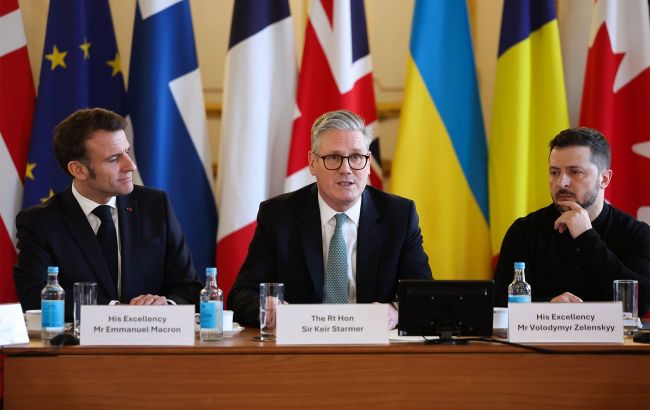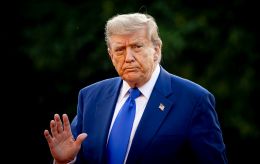What is Coalition of the Willing and what is its role in supporting Ukraine
 French President Emmanuel Macron, UK Prime Minister Keir Starmer, Ukrainian President Volodymyr Zelenskyy (Photo: Getty Images)
French President Emmanuel Macron, UK Prime Minister Keir Starmer, Ukrainian President Volodymyr Zelenskyy (Photo: Getty Images)
Today, May 10, a new meeting of the Coalition of the Willing will take place – a union of countries actively supporting Ukraine in its full-scale war with Russia. It is expected that the allies will discuss security guarantees for Ukraine in the event of a potential ceasefire agreement.
For more details on the Coalition of the Willing and what is known about the upcoming meeting, read the article by RBC-Ukraine.
Takeaways
- How did the Coalition of the Willing come about
- Which countries are part of the coalition
- What is known about the allies' meeting on May 10
What you need to know about the Coalition of the Willing
The Coalition of the Willing is an alliance of countries committed to supporting Ukraine in its war against Russia.
The initiative to create the coalition was officially announced on March 2, 2025, by UK Prime Minister Keir Starmer during a summit in London.
The coalition aims to consolidate European support for Ukraine in its full-scale war with Russia and to coordinate the efforts of its allies amid the unstable policies of the United States.
The name of the coalition stems from a call by Czech President Petr Pavel to form a broad coalition of those determined to counter Russian aggression.
Who supports Ukraine: Coalition's composition
The Coalition of the Willing includes European Union countries, NATO members, as well as states outside of these blocs.
Among the coalition's participants are: Australia, Belgium, Bulgaria, Canada, Czechia, Denmark, Finland, France, Germany, Greece, Iceland, Italy, Latvia, Lithuania, Luxembourg, the Netherlands, New Zealand, Norway, Poland, Portugal, Romania, Spain, Sweden, Türkiye, and the UK.
France and the UK play a key role in organizing and driving the coalition's activities.
Chronology of meetings
Since its establishment, the Coalition of the Willing has held a series of meetings at various levels to coordinate actions and discuss key issues regarding support for Ukraine:
March 2, 2025: The first summit of the participating countries' leaders in London, where the creation of the coalition was officially announced.
March 11, 2025: A meeting of military representatives from coalition countries in Paris.
March 15, 2025: A virtual meeting of the leaders of the participating countries.
March 20, 2025: A meeting of military representatives in the UK.
March 27, 2025: A coalition summit in Paris, with the personal participation of Ukrainian President Volodymyr Zelenskyy and French President Emmanuel Macron. Topics discussed included short-term support, security guarantees, and future security architecture.
April 10, 2025: A meeting of defense ministers from coalition countries in Brussels, organized by the UK and France. The main focus was on security guarantees for Ukraine and measures to support long-term peace.
Plans and goals of the Coalition of the Willing
During the most recent meeting of the coalition, UK Defense Minister John Healey stated that the allies had developed a support plan for Ukraine, which includes four key objectives: ensuring secure airspace, secure seas, peace on land, and supporting the Ukrainian Armed Forces as a powerful deterrent.
Overall, the topics discussed at the Coalition of the Willing summits include:
- Providing comprehensive support to Ukraine, including military, financial, logistical, and intelligence assistance.
- Considering the possibility of deploying international security forces in Ukraine if a ceasefire agreement with Russia is reached.
- Actively discussing and developing long-term security guarantees for Ukraine.
- Exploring alternative mechanisms for ensuring security, given the political and logistical challenges of sending peacekeeping forces.
- Supporting Ukraine in the negotiation process to achieve a just peace and strengthen its defense capabilities.
At the same time, as reported by the British publication The Times, despite initial plans to send a significant military contingent to monitor compliance with a potential peace agreement, recent discussions among the participating countries suggest a shift in focus toward training Ukrainian soldiers, rearming the Ukrainian Armed Forces, and ensuring Ukraine's air and sea protection.
The Times also noted that European countries are unable to field even 25,000 soldiers for deployment to Ukraine due to a shortage of personnel and insufficient funding for their armed forces.
Coalition of the Willing meeting in Kyiv
Exactly one month after the previous meeting, on May 10, 2025, a summit of the coalition's leaders will take place in Kyiv in a hybrid format – with some participants attending in person and others joining online.
Ukrainian President Volodymyr Zelenskyy announced the summit, emphasizing that the coalition must be strong enough to guarantee security according to a shared vision.
He highlighted the importance of the coalition in strengthening Europe's security architecture and stated that specific meetings within the coalition would take place on May 10, although he did not disclose further details.
Ukrainian Foreign Minister Dmytro Kuleba stated that President Volodymyr Zelenskyy plans to meet with the leaders of the Coalition of the Willing to discuss security guarantees for Ukraine following a potential ceasefire agreement with Russia.
French President Emmanuel Macron confirmed the coalition's meeting, though he did not specify the format of his participation, only noting that he would personally travel to Kyiv at the appropriate time.
Earlier, Politico reported on the potential visit to Ukraine by Germany's new Chancellor Friedrich Merz in early May, likely referring to the Coalition of the Willing summit.
Ahead of the summit, discussions intensified regarding a 30-day ceasefire between Ukraine and Russia.
It was reported that the US and European allies are finalizing a proposal for a ceasefire, but if Moscow refuses to agree, additional sanctions against Russia are being prepared.
The preparation was informed by publications from The Guardian, The Times, Politico, BFMTV, and statements from the press service of the Office of the President of Ukraine.
Earlier, it was announced that on May 10, traffic would be temporarily restricted on several central streets in Kyiv due to the presence of foreign delegations and the holding of ceremonial events.
It was also confirmed that on May 10, the Maidan Nezalezhnosti metro station would be closed for entry and exit for passengers during the first half of the day.

